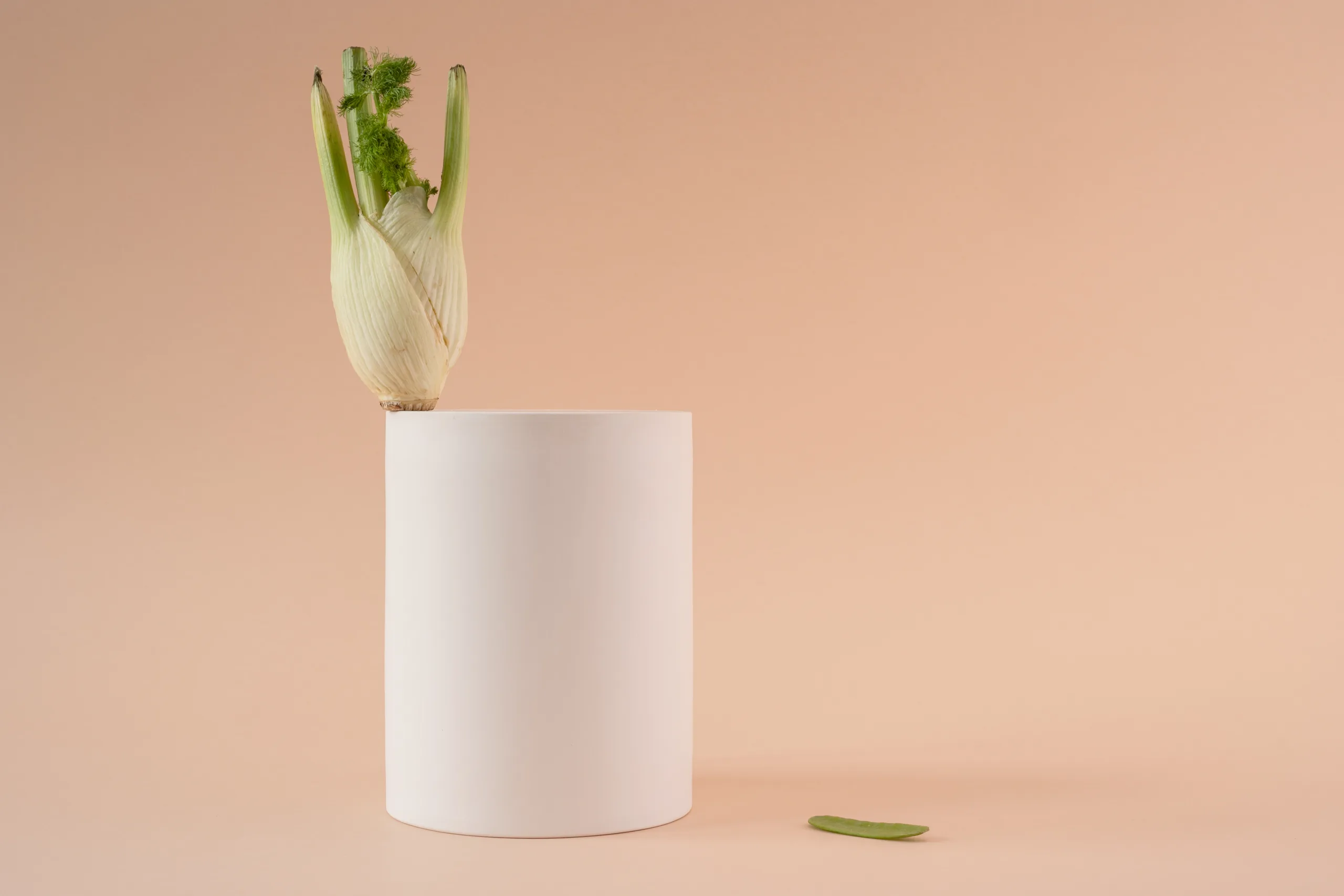Do you suffer from stomach issues such as bloating, abdominal pain and gas? If so, you may have heard of the Low FODMAP diet. But have you heard of Fennel? Is Fennel Low FODMAP?
If you’re looking for an answer to this question, you’ve come to the right place. In this article, we’ll explore the FODMAP content of fennel and provide tips on how to include it in a Low FODMAP diet. We’ll also discuss what FODMAPs are and why they can cause stomach issues. With this knowledge in hand, you can make informed decisions about which foods are best for your own health.
Yes, Fennel is Low FODMAP. Fennel has a mild anise-like flavor and is often used as a vegetable or herb in cooking. It is low in fermentable carbohydrates, making it suitable for the Low-FODMAP diet.
FODMAP
FODMAP stands for Fermentable Oligo-saccharides, Di-saccharides, Mono-saccharides and Polyols. It is a group of short-chain carbohydrates that are found in everyday foods. FODMAPs are poorly absorbed by the small intestine and can be difficult to digest. This can lead to digestive discomfort, bloating, and flatulence in some people.
FODMAPs are found in a variety of foods including wheat, dairy, garlic, onion, beans, apples and pears. People who have difficulty digesting FODMAPs may benefit from following a low FODMAP diet. This involves avoiding or limiting these foods to reduce symptoms of digestive distress.
The low FODMAP diet is used to help identify which types of carbohydrates may be causing digestive discomfort in individuals with irritable bowel syndrome (IBS). It is important to note that the low FODMAP diet is not intended as a long-term solution for digestive symptoms but rather as a tool for identifying trigger foods and helping to develop an individualized eating plan that works best for each person’s needs.
Following the low FODMAP diet can be difficult as it requires careful planning and avoiding many common foods. People considering this approach should first speak with their doctor or dietitian who can provide guidance on how to follow the diet correctly and safely.
Low FODMAP Serving Sizes for Fennel
Fennel is a low FODMAP food, which means it can be enjoyed in moderation as part of a healthy and balanced diet. The recommended serving size for those following the low FODMAP diet is 1/4 cup (40 g) of chopped fennel bulb. This serving size provides approximately 1 g of total FODMAPs. Larger servings may contain more than 1 g of total FODMAPs, so it’s best to stick to the recommended portion size when following the low FODMAP diet.
It’s important to note that fennel fronds are much higher in FODMAPs than the bulb and should be avoided when following the low FODMAP diet. However, if you want to add fennel fronds to your meals, then the recommended serving size is 2 tablespoons (3 g). This small amount should not increase your overall intake of FODMAPs too much and should be safe for those following a low-FODMAP diet.
Click here to preview your posts with PRO themes ››
Overall, it’s best to stick to the recommended serving sizes when enjoying fennel as part of a low-FODMAP diet. Doing so will help ensure that your overall intake of FODMAPs remains within recommended limits and helps keep symptoms at bay.
Can I Eat Fennel on a Low FODMAP Diet?
Fennel is a vegetable that can be enjoyed in moderation on the low FODMAP diet. It has a mild anise-like flavor and is often used as a crunchy topping for salads or roasted as a side dish. While fennel is a low FODMAP food, it can become high FODMAP when consumed in large amounts.
The low FODMAP serving size of fennel is 1/2 cup or 75 grams of fresh fennel bulb. This serving size contains 2 grams of total FODMAPs. Larger servings may contain higher levels of mannitol, sorbitol, and other polyols.
Fennel leaves may also be eaten on the low FODMAP diet, but the serving size should be limited to 1 tablespoon or 5 grams per sitting. This small portion contains only trace amounts of total FODMAPs and can be enjoyed without triggering digestive symptoms for most people.
When shopping for fennel, look for bulbs that are firm with no signs of wilting or browning. The fronds should be bright green with no discoloration or browning around the edges. Avoid any bulbs that have soft spots or are beginning to sprout seeds as these may indicate spoilage.
When preparing fennel, it should be washed thoroughly to remove any dirt or debris that may have accumulated during storage and transport. The edible parts include both the bulb and fronds, though some people prefer to discard the hard core near the base before cooking it up.
Overall, fennel is an excellent addition to a well-rounded low FODMAP diet when consumed in moderation and prepared properly. Eating too much can cause digestive discomfort in some people, so it’s important to stick to recommended serving sizes whenever possible.
Is Fennel Good For IBS Symptoms?
Fennel is a popular herb that has long been used in traditional medicine to treat many health conditions, including irritable bowel syndrome (IBS). It is known to have anti-inflammatory and anti-spasmodic properties, making it a potentially beneficial treatment for IBS. Research suggests that fennel can reduce abdominal pain, bloating, and other symptoms associated with IBS.
Fennel contains compounds called monoterpenes and flavonoids which have been shown to reduce inflammation in the digestive tract and help relax the muscles of the intestinal walls. This can help reduce abdominal pain, cramping, and spasms that are commonly associated with IBS. Additionally, fennel may also help improve digestion by stimulating the production of digestive juices such as bile and saliva.
Another potential benefit of fennel is its ability to reduce bloating and gas. Fennel contains dietary fiber which helps to promote regular bowel movements and prevent constipation. It may also help reduce gas production by promoting better digestion of food in the intestines.
In addition to its medicinal properties, fennel can also be used as an ingredient in food recipes or consumed on its own. It has a mild flavor that some people find pleasant when eaten raw or cooked with other foods. Fennel can be consumed in a variety of forms such as fresh leaves or seeds, dried leaves or seeds, capsules, tablets, tinctures, teas or oils.
Click here to preview your posts with PRO themes ››
Overall, there is some evidence that suggests that fennel may be beneficial for those suffering from IBS symptoms such as abdominal pain and bloating. However, more research is needed before any definitive conclusions can be made about its effectiveness in treating IBS symptoms. If you are considering using fennel for your IBS symptoms it is important to speak with your doctor first before starting any new treatment regimen.

How to Cook Fennel in Low FODMAP Dishes
Fennel is a flavorful, aromatic vegetable that can add a unique flavor to any dish. Unfortunately, for those with sensitive stomachs due to Irritable Bowel Syndrome or other digestive issues, fennel can trigger uncomfortable symptoms. But with a few modifications, it is still possible to enjoy this tasty vegetable without the risk of triggering a flare-up. Here are some tips for cooking fennel in low FODMAP dishes.
The first step is to choose the right type of fennel. Bulb fennel is the variety most commonly used in cooking, and it’s also the one with the highest levels of FODMAPs. Instead, opt for Florence fennel which has much lower levels of these compounds and can be enjoyed without fear of triggering symptoms.
When preparing Florence fennel, make sure to remove all of the tough outer layers and discard them before cooking as these are where most of the FODMAPs are concentrated. Once you’ve removed these layers, you can chop or slice the remaining bulb into pieces that are suitable for your dish.
When it comes time to cook your fennel, keep in mind that boiling or steaming will reduce its FODMAP content even further compared to roasting or baking. If you’re looking for an even lower FODMAP option, consider mashing cooked Florence fennel into a puree as this will reduce its FODMAP content significantly compared to other cooking methods.
Finally, remember that when it comes to low-FODMAP recipes, it’s important to consider not only the ingredients but also how they’re prepared and combined with other ingredients. For example, adding garlic or onions (both high-FODMAP foods) may increase the overall FODMAP content of your dish even if you’re using low-FODMAP vegetables like Florence fennel.
By following these simple tips for cooking with Florence fennel in low-FODMAP dishes, you can still enjoy all its delicious flavor without risking uncomfortable symptoms later on!
Can I Have Roasted or Raw Fennel on the Low FODMAP Diet?
Yes, both roasted and raw fennel can be enjoyed on a low FODMAP diet. Fennel is a vegetable that can be enjoyed in many ways, including roasted and raw. Roasting fennel brings out its sweet flavour and gives it a crunchy texture. It can be served as a side dish, in salads, or even as part of an entrée. Raw fennel has a more subtle taste, but it still adds plenty of flavour to dishes when added in small amounts. It is often used in salads and slaws, as well as being a great addition to smoothies and juices.
Click here to preview your posts with PRO themes ››
When following a low FODMAP diet, it is important to remember that some vegetables are high in FODMAPs and should be avoided or eaten in very small amounts. While fennel is generally deemed safe to consume on the low FODMAP diet, it’s best to consult with your doctor or dietitian before adding it to your meal plan. Depending on your individual tolerance levels, you may need to adjust the amount of fennel you consume when eating roasted or raw versions of the vegetable.
Overall, both roasted and raw fennel can be enjoyed on a low FODMAP diet as long as they are eaten in moderation. Roasting fennel brings out its sweetness and provides an enjoyable crunchy texture, while raw fennel adds subtle flavor without being overpowering. With careful monitoring of portion sizes, you can enjoy both varieties of this delicious vegetable without risking triggering your symptoms.
The Benefits of Low FODMAP Foods
Eating low FODMAP foods is an effective way to manage irritable bowel syndrome (IBS) and other digestive issues. A low FODMAP diet eliminates certain types of carbohydrates that can be difficult for the body to digest, such as fructose, lactose, fructans and polyols. By avoiding these foods, the body is able to better absorb nutrients from other foods and reduce symptoms like bloating, gas and abdominal pain.
In addition to reducing symptoms of IBS, eating a low FODMAP diet can also help improve overall digestive health. By avoiding certain types of carbohydrates, the body is able to better absorb essential vitamins and minerals from other foods. This can lead to increased energy levels and improved overall health. Additionally, eating a low FODMAP diet can also help balance gut bacteria, which helps support healthy digestion and immunity.
Finally, eating a low FODMAP diet may help reduce inflammation in the body. Certain types of carbohydrates can cause inflammation in the gut which can lead to chronic conditions like Crohn’s disease or arthritis. By avoiding these triggers it is possible to reduce inflammation in the body and improve overall health.
In conclusion, eating a low FODMAP diet has many benefits for those suffering from digestive issues like IBS or Crohn’s disease as well as for those looking to improve their overall health. By eliminating difficult-to-digest carbohydrates from your diet you can reduce symptoms of digestive issues while improving your nutrient absorption and reducing inflammation in your body.

Conclusion
Fennel is a versatile vegetable with a unique taste and aroma that adds flavor to many dishes. It is also high in fiber and vitamins, making it a healthy choice for those following a low FODMAP diet. Its low FODMAP content makes it suitable for those with irritable bowel syndrome (IBS) or other digestive issues. The key to successfully incorporating fennel into an IBS diet is to monitor your individual tolerance levels, as everyone is different. Therefore, it is best to consult with your doctor or nutritionist before making any significant changes to your diet.
In conclusion, fennel can be an excellent addition to a low FODMAP diet as it is low in FODMAPs but still provides valuable nutrition and flavor. As always, it’s important to listen to your body and discuss any dietary changes with your doctor or nutritionist before beginning any dietary program.

